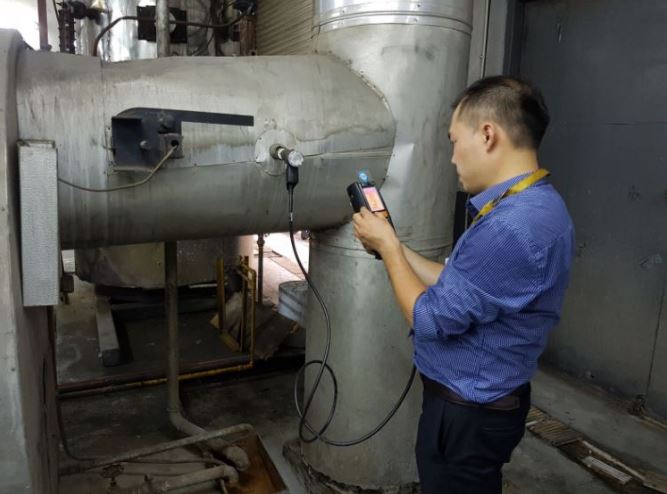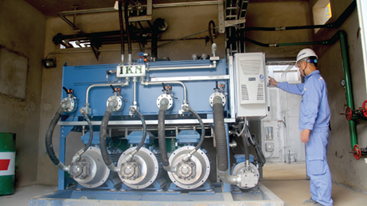Saturday, 27/07/2024 | 06:35 GMT+7
The energy audit is crucial for energy efficiency. Through this step, the energy performance of each machine, line, and technology will be revealed. How effective energy management approaches and tools will be shown also. From then, energy managers could make some appropriate adjustments to diminish energy loss, which also means reducing costs and improving competitiveness. Besides, energy efficiency helps build an image of “green enterprises” which helps leverage their reputation and competitive advantages. For key energy-use facilities, it is an obligatory responsibility.

Conducting energy audits helps enterprises improve their energy efficiency
However, several enterprises haven’t built energy management systems and annual energy-use plans due to the lack of awareness about the importance of energy audits. Especially, many of them underestimate the important role of energy audits when energy costs account for just a minor portion of their total costs, and struggle in fund mobilization for energy efficiency. Plus, preferential capital accessibility faces various challenges, including non-preferential or low preferential interest rates and complicated loan procedures, for instance, making low interest on enterprises' energy audit investments.
To help enterprises resolve those problems, Industrial Promotion and Consulting Center (IPCC) for Industrial Development of Sơn La Province uses its funds to build plans and help local enterprises conduct energy audits yearly. This approach has helped Son La enterprises search for reduced-energy-loss measures, like switching to high-energy-performance equipment, and raise awareness among private sectors and individuals, thereby alleviating high pressure of energy supply at both provincial and national levels.
In 2022, IPCC of Sơn La Province collaborated with the Department of Finance and Infrastructure of Mộc Châu town to review and support a local business, Kien Son Joint Stock Company, to manage their energy use. The total work amount cost VND 100 million, half from the local authorities and the rest from the enterprise.
“Our average energy cost is about VND 20 million. In 2022, being selected to participate in the project, we have a chance to conduct energy audits that help us find appropriate measures to improve energy efficiency, increase revenue and protect the environment”, Director of Kien Son JSC. Nguyen Ngoc Kien said.
In the preceding time, the local business also received a fund from IPCC of Son La Province to support them to equip a new drying machine. It costs VND one billion, including 30% came from the IPCC’s funding. This is a key technology that contributes to the unique quality of Kien Son’s grass noodle products.
According to MOIT, the industry accounts for over 50% of total energy use. The energy saving potential of the sector is around 30-35%. Hence, saving energy not only helps enterprises reduce their costs but also contributes to alleviating the pressure on energy supply of the whole system. |
Minh Khue edited. Giang Nguyen translated.



.jpg?w=367&h=206&mode=crop)




.jpg?w=367&h=206&mode=crop) Notice for Contracts award for Support to Industrial Enterprises for Energy Audits and Preparation of Feasibility Studies (Package No. C2.2.4)
04/06/2024
Notice for Contracts award for Support to Industrial Enterprises for Energy Audits and Preparation of Feasibility Studies (Package No. C2.2.4)
04/06/2024
 Training Courses for Energy Managers and Energy Auditors
Training Courses for Energy Managers and Energy Auditors
 Vietnam Energy Outlook Report – Pathway to Net Zero
Vietnam Energy Outlook Report – Pathway to Net Zero
 Long Son Cement saves 30% of electricity consumption thanks to heat recovery
Long Son Cement saves 30% of electricity consumption thanks to heat recovery
 Expression of Interest: C2.1.15: Development of Energy-Efficient Technology Catalogs for the Industrial Sector
Expression of Interest: C2.1.15: Development of Energy-Efficient Technology Catalogs for the Industrial Sector
 Optimizing Compressed Air Systems for Southern Industrial Enterprises
Optimizing Compressed Air Systems for Southern Industrial Enterprises
 The Ministry of Industry and Trade Review the Energy Efficiency and Conservation activities in Lao Cai.
The Ministry of Industry and Trade Review the Energy Efficiency and Conservation activities in Lao Cai.
 EOI Extension: C2.2.2: Review and update for current EE benchmarking for 2 sub-industrial sectors
EOI Extension: C2.2.2: Review and update for current EE benchmarking for 2 sub-industrial sectors